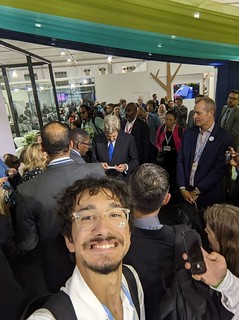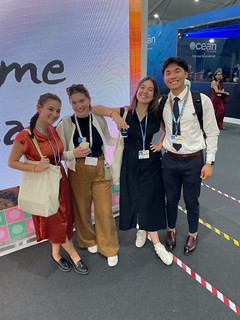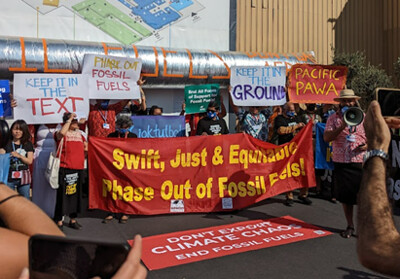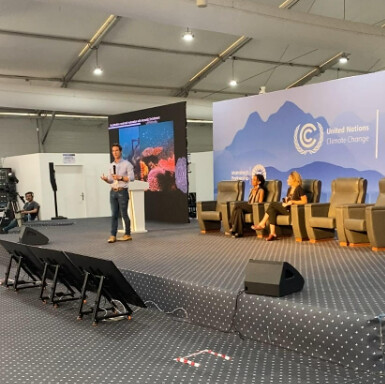Attending the UN Conference of the Party (COP) has been one of the most incredible experiences and I am immensely grateful for this opportunity. It allowed for unique access to the highest level of climate discussion in the world. These discussions utilize many unique formats. There are engaging panels, reporting mechanisms, and negotiations that all occur simultaneously. At times it can be overwhelming, but it allows for a well-rounded perspective of climate action at multiple scales. There are visible differences in the structure, organization, and often even the atmosphere of different events.

I had the opportunity to attend the Special Report on the Emission Gap Assessment. This discussion presented the sobering reality that we are not on target to meet the 1.5 degree Celsius of warming which is a threshold in which the impacts of climate change will have increasingly devastating consequences. We are currently already at 1.1 degree Celsius of warming and the window is closing to minimize warming to 1.5 degrees. Each increment of warming has a profound impact and steps need to be taken to minimize each decimal point of warming to prevent greater adverse consequences. This presentation was data-oriented and comprised of implementation components, overall assessment, and explanations. It allows for a reflection that was made in the past year since COP26. This report is the compilation of numerous data collection points synthesized into major takeaways. There needs to be a 45% reduction in greenhouse gasses to hit the 2 degree Celsius threshold, but there has only been a 1% reduction. This highlighted that we need wide-scale, rapid systemic transformation to meet these goals. This discussion was dynamic and visual with the use of presentations and graphical figures. Audience members had the opportunity to interact directly with the panelists following the discussion of the report which promoted a sense of collective action. While it is challenging to hear these statistics and how far we are from our collective target, hearing this information relayed firsthand from United Nation Officials, such as Inger Andersen and Simon Stiell, was inspiring because it is a reminder that there is accountability through reporting.
Additionally, I came into the conference knowing that I wanted to see a negotiation firsthand within a negotiation room. The goals of negotiations themselves are to provide a space for the delegates to craft documents, develop frameworks, and reach a consensus. The party members are representatives of their respective countries and aim to ensure that their agenda is advanced throughout negotiations. Ultimately it is where decisions are made. As a result, the information, content, and format are less accessible. For example, it can be challenging to find the documents that delegates are reviewing. The session I attended was spent going through a document about clean development and proposing changes to the language within the document. While somewhat dry and challenging to follow, these negotiations allow interesting insight into the structure of the UNFCC. Negotiation is also the backbone of the international agreements and ultimately actions that emerge from this conference.
In complement to attending a negotiation, through the YEAH Network, we had the opportunity to directly interact with two United State negotiators, Laura Ashley and Dr. Evan Notman. It was clear that there is an overall position that the negotiation team predetermines. While it is positive to have targeted action items it seemed like this could stifle progress. Especially in a partisan nation such as the U.S., it seemed as though there would have to compromise on progress for the sake of collaboration across party lines. There also seems to be a lack of transparency in terms of who is setting and contributing to the U.S. agenda and the level of influence that even the negotiators themselves have. The negotiators seemed to be primarily focused on adaptation efforts and when asked, they seemed to believe that the U.S. was making progress. And while there have been observable incremental improvements, it is important to hold these individuals, and the United States as an institution, accountable for comprehensive and timely climate action and mitigation.
Every discussion at COP has encouraged me to rethink my perspective, undergo personal growth, and well as remain critical of the system around me. These discussions were shaped by the modality that they were in whether that be a report, a negotiation, or a personal meeting. Throughout the week there have been moments of inspiration, but also of frustration as well. One thing is clear, action on climate change is long overdue and there needs to be collective, international change now.





 This past Tuesday, our cohort attended an event presenting on the Emission Gap Report by the United Nations (UN). This report provides an updated assessment on the gap between our current global greenhouse gas (GHG) emissions and our goals for 2030 to limit the global temperature below 1.5 degree Celsius. This is necessary to minimize the most significant harm from climate change as determined by the Paris Agreement of 2015.
This past Tuesday, our cohort attended an event presenting on the Emission Gap Report by the United Nations (UN). This report provides an updated assessment on the gap between our current global greenhouse gas (GHG) emissions and our goals for 2030 to limit the global temperature below 1.5 degree Celsius. This is necessary to minimize the most significant harm from climate change as determined by the Paris Agreement of 2015. Before my arrival at COP27, I had a dream that I could open any book, jump into its pages and be immersed in its story. I woke up imagining all the stories I would want to live. But simultaneously I thought of the stories I would not want to experience. These are the ones that frightened me or made me feel anxious, alone, helpless.
Before my arrival at COP27, I had a dream that I could open any book, jump into its pages and be immersed in its story. I woke up imagining all the stories I would want to live. But simultaneously I thought of the stories I would not want to experience. These are the ones that frightened me or made me feel anxious, alone, helpless. One of the most impactful experiences I have had as an observer at COP27 occurred at a small pavilion hosted by an NGO. I wasn’t initially planning on stopping by the pavilion, but a representative saw me walking by and asked if I would be interested in participating in a small group discussion with other COP27 participants. Often, many of the country negotiators (the ones actually writing and reforming policy) are noticeably absent from the bustle of the pavilions and panel discussions. Instead, these spaces are usually filled with activists, organization members, or observers, while negotiators tend to stick to meeting rooms and work offices. I was therefore surprised when I joined the small group– in addition to organization members and observers, I was sitting next to negotiators from France, South Sudan, and Yemen.
One of the most impactful experiences I have had as an observer at COP27 occurred at a small pavilion hosted by an NGO. I wasn’t initially planning on stopping by the pavilion, but a representative saw me walking by and asked if I would be interested in participating in a small group discussion with other COP27 participants. Often, many of the country negotiators (the ones actually writing and reforming policy) are noticeably absent from the bustle of the pavilions and panel discussions. Instead, these spaces are usually filled with activists, organization members, or observers, while negotiators tend to stick to meeting rooms and work offices. I was therefore surprised when I joined the small group– in addition to organization members and observers, I was sitting next to negotiators from France, South Sudan, and Yemen. After three days of the conference, I am still in disbelief that I have the privilege to be in Sharm el-Sheikh, Egypt for COP27. Expanding my knowledge on climate change started on the bus to the JFK airport, in discussions with my peers about their perspectives on clean and renewable energy, Indigenous approaches to climate action and more. Intellectually I am attempting to absorb as much information as I can on everything that I am interested in or know nothing about. It has been an emotional rollercoaster going from being overwhelmed by the breadth and depth of climate change, to realizing that heartbreak for the destruction of life on our planet is the reason we are drawn here (Professor Phoebe Godfrey said it best), to contemplating my role in climate action, and to gaining hope for our future from all the technology, knowledge, innovations, art, poetry, and passions showcased at the conference. Each day I wish I could be at multiple places at one time and jot down everything I am learning. Every day I am humbled by how much I didn’t know about climate change and climate solutions.
After three days of the conference, I am still in disbelief that I have the privilege to be in Sharm el-Sheikh, Egypt for COP27. Expanding my knowledge on climate change started on the bus to the JFK airport, in discussions with my peers about their perspectives on clean and renewable energy, Indigenous approaches to climate action and more. Intellectually I am attempting to absorb as much information as I can on everything that I am interested in or know nothing about. It has been an emotional rollercoaster going from being overwhelmed by the breadth and depth of climate change, to realizing that heartbreak for the destruction of life on our planet is the reason we are drawn here (Professor Phoebe Godfrey said it best), to contemplating my role in climate action, and to gaining hope for our future from all the technology, knowledge, innovations, art, poetry, and passions showcased at the conference. Each day I wish I could be at multiple places at one time and jot down everything I am learning. Every day I am humbled by how much I didn’t know about climate change and climate solutions.